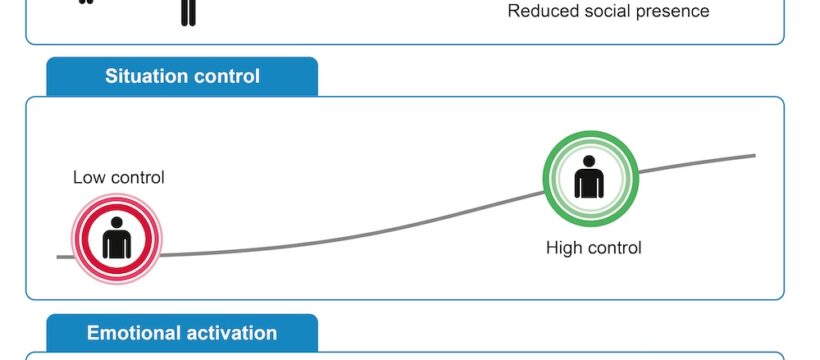A study led by Karl Landsteiner University of Health Sciences shows that social presence boosts emotional vitality – but leads to delayed fatigue.
Krems (Austria), 15. July 2025 – Social contact can lift our mood but later leave us drained. A new study has tracked this full emotional sequence in everyday life. Researchers found that being around others boosts emotional energy at the moment, yet contributes to rising fatigue a few hours later. By combining smartphone surveys with Bluetooth-based sensing, the team at Karl Landsteiner University of Health Sciences (KL Krems) captured both effects within a shared time frame. Their results reveal how everyday encounters shape emotional states not just instantly, but across hours.
Understanding how social contact influences emotional well-being is a core concern in psychology, but studying it in real life has long been a challenge. Self-report methods are often cumbersome or unreliable. In this study, researchers combined experience sampling – brief smartphone surveys – with passive Bluetooth scanning over two weeks. Eighty adult participants responded four times a day about how they felt, generating more than 3,700 emotional data points. Simultaneously, their phones logged over 123,000 nearby Bluetooth devices, used as a proxy for social presence. The study tracked four mood states – vigor, fatigue, dejection, and anger – and was conducted by the Division of Psychological Methodology at KL Krems.
High & Low
“Social interactions are typically seen as energizing – and our study confirms that this is indeed the case,” says Dr. David Willinger, MSc, Scientific Staff (PostDoc) at the Division of Psychological Methodology at KL Krems. “What’s striking is how clearly we could trace both the immediate uplift and the delayed fatigue within a single time-resolved framework.” The data showed a consistent pattern: emotional vitality, or vigor, surged when people were around others, while feelings of dejection fell. But three to four hours later, fatigue levels began to rise. “It’s like a social sugar high,” Willinger explains. “Great at the moment, but with a price down the line.”
To explore how social presence affects emotion, the researchers applied three complementary methods. Linear mixed-effects models (detects patterns across repeated measures within and between individuals) captured both immediate and delayed links between proximity and mood. A continuous-time structural equation model (estimates how variables influence each other over time, including feedback loops) traced how social contact and negative affect influenced each other over several hours. Finally, a multi-state model (identifies shifts between distinct psychological states and how long they persist) showed moves between energized and fatigued states. Taken together, these approaches offered a detailed and reliable picture of emotional dynamics unfolding in everyday life.
While earlier research had documented both mood elevation and delayed fatigue, this study is the first to show both effects unfolding within the same temporal sequence and with high temporal precision. Vigorous emotional states tended to last longer than fatigued ones. Yet more intense social presence made transitions from vigor to fatigue more likely. The benefits of interaction, in other words, may wear off before the emotional costs are felt. The data also showed that a stronger sense of control over the situation helped participants recover from fatigue and maintain emotional stability.
Time Shift
The results refine existing theories such as social baseline theory and social allostasis, which describe the emotional effects of social presence. What this study adds is a clear picture of how these effects shift over time. Emotional responses, the data show, are not static – they evolve across hours depending on social intensity and context. By combining dense real-life data with advanced modelling, researchers at KL Krems have produced a rare, time-based map of how social exposure plays out emotionally in the flow of everyday life. The work highlights the university’s growing role in psychologically grounded, real-world research.
Graphic available on request
Original publication:
Bluetooth-sensed social presence is associated with immediate vigor and delayed fatigue: A multi-method time series analysis, D. Willinger: S. Stieger: iScience (2025) 28, 112726. https://doi.org/10.1016/j.isci.2025.112726. https://kris.kl.ac.at/de/publications/bluetooth-sensed-social-presence-is-associated-with-immediate-vig
Karl Landsteiner University of Health Sciences (07/2025)
The Karl Landsteiner University of Health Sciences (KL Krems) is an educational and research institution on the Campus Krems and recognised throughout Europe. KL Krems offers modern, demand-oriented education and continuing education in medicine and psychology as well as a PhD programme in Mental Health and Neuroscience. The flexible educational programme is tailored to the needs of students, the requirements of the labour market and the challenges of science. The three university hospitals in Krems, St. Pölten and Tulln and the MedAustron Ion Therapy and Research Centre in Wiener Neustadt guarantee clinical teaching and research of the highest quality. In its research, KL Krems focuses on interdisciplinary fields with high relevance to health policy – including biomechanics, molecular oncology, mental health and neuroscience as well as the topic of water quality and the associated health aspects. KL Krems was founded in 2013 and accredited by the Austrian Agency for Quality Assurance and Accreditation (AQ Austria).
Scientific Contact
Dr. David Willinger, MSc
Division of Psychological Methodology
Karl Landsteiner University of Health Sciences
Dr.-Karl-Dorrek-Straße 30
3500 Krems / Austria
M +43 664 61 94 674
E david.willinger@kl.ac.at
W https://www.kl.ac.at/
Karl Landsteiner University of Health Sciences
Mag. Selma Vrazalica, BA
Communication, PR & Marketing
Dr.-Karl-Dorrek-Straße 30
3500 Krems / Austria
T +43 2732 72090 237
M +43 664 883 99 603
Copy Editing & Distribution
PR&D – Public Relations for Research & Education
Dr. Barbara Bauder-Jelitto
Kollersteig 68
3400 Klosterneuburg / Austria
M +43 664 1576 350
E bauder@prd.at
L https://www.linkedin.com/company/prd-public-relations-für-forschung-bildung

